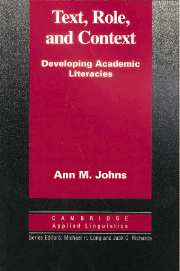Book contents
- Frontmatter
- Contents
- Series editors' preface
- Preface
- Acknowledgments
- 1 Literacy and pedagogy: Three views
- 2 Genre knowledge and socioliteracies: What readers and writers may share
- 3 Genre and social forces: “Homely” and academic texts
- 4 Discourse communities and communities of practice: Membership, conflict, and diversity
- 5 Special roles: Literacy practitioners as campus mediators and researchers
- 6 Students as researchers: Investigating texts, processes, and contexts
- 7 The socioliterate classroom: Basic tenets and goals
- 8 Putting tenets and goals into practice: Using portfolios in literacy classrooms
- 9 Conclusion
- References
- Index
7 - The socioliterate classroom: Basic tenets and goals
Published online by Cambridge University Press: 05 October 2012
- Frontmatter
- Contents
- Series editors' preface
- Preface
- Acknowledgments
- 1 Literacy and pedagogy: Three views
- 2 Genre knowledge and socioliteracies: What readers and writers may share
- 3 Genre and social forces: “Homely” and academic texts
- 4 Discourse communities and communities of practice: Membership, conflict, and diversity
- 5 Special roles: Literacy practitioners as campus mediators and researchers
- 6 Students as researchers: Investigating texts, processes, and contexts
- 7 The socioliterate classroom: Basic tenets and goals
- 8 Putting tenets and goals into practice: Using portfolios in literacy classrooms
- 9 Conclusion
- References
- Index
Summary
When students from [diverse] backgrounds experiment with academic discourse, they are doing more than trying on a linguistic disguise; they are experimenting as well with new identities, new ways of thinking and being…. Increasingly, theorists and researchers acknowledge that the linguistic challenges these students face are intricately connected to a broad web of cognitive, social and affective concerns … that these students navigate not only among ways of using language but, indeed, among worlds (DiPardo, 1993, p. 7).
After fourteen years of being taught that the text has all the answers, is it any surprise that some students find it hard to understand that they must read rhetorically, they must ask about author's purpose and context in order to use knowledge productively (Geisler, 1994, p. 49)?
At some point in their professional lives, most literacy instructors must have asked themselves a question similar to this one:
Given the short time I have to work with my students, how can I best prepare them for the varied and unpredictable literacy challenges that they will confront in their academic and professional lives?
No matter how ideal or constrained our teaching environments, we always seem to have too little time in our classes to accomplish what appears to be the impossible: equipping students with the confidence, motivation, language, skills, abilities, and insights necessary to succeed in textual worlds that we, and they, cannot predict. This chapter suggests some general tenets and pedagogical principles that can assist us in answering the vexing question posed above. The chapter also presents specific ways in which these tenets and principles can be carried out.
- Type
- Chapter
- Information
- Text, Role and ContextDeveloping Academic Literacies, pp. 114 - 130Publisher: Cambridge University PressPrint publication year: 1997

